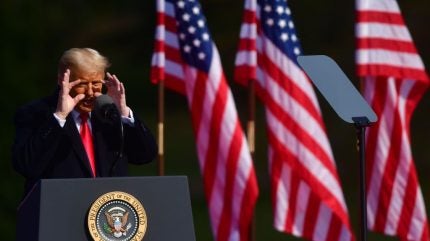

It’s been long, it’s been bitter, and the end still seems a long way away. At some point, however, we will know whether it will be four more years for Donald Trump or if Joe Biden will become the 46th president of the United States of America.
Trump’s election in 2016 jolted the world. Coming on the back of a widely unexpected Brexit vote in the UK, the events seemed to usher in a wave of populism in the West. Trump had rallied against globalisation, taking particular aim at the Trans-Pacific Partnership – which was soon ditched upon his inauguration – and Nafta, which has since been replaced by the US-Mexico-Canada Agreement, largely considered to be more favourable to the US than its predecessor. Seemingly inspired by Trump, other major economies – most notably Brazil – went down the anti-globalisation, strongman route.

Discover B2B Marketing That Performs
Combine business intelligence and editorial excellence to reach engaged professionals across 36 leading media platforms.
That globalisation was barely mentioned in the 2020 debate perhaps signifies a long-term victory for Trump, irrespective of the final result. What policies Biden will pursue should he emerge victorious remain to be seen, but in this look at what kind of president Joe Biden would be for foreign investment, Sebastian Shehadi notes that “in several key areas of domestic and foreign policy, Biden and Trump share more than one might expect. This is most evident with regards to the US-China trade war”.
This war has been theme running through the Trump presidency, and it is something that has been covered in depth across Investment Monitor and our sister sites. On Investment Monitor we have assessed whether Covid-19 has delivered a final death blow to US-China FDI, we have looked at the US states most reliant on Chinese investment (the twist being that they are mostly those that voted for Trump in 2016, as shown in the chart below), and we have covered the storm over TikTok’s growth and influence in the US.
Another key theme in the election has been how the US has dealt with the Covid-19 outbreak. The pandemic has had a dramatic impact on FDI screening regulations all over the world, with the US ramping up its protectionism over the past nine months. More positively, the Covid crisis is helping to revive the US infrastructure sector.

US Tariffs are shifting - will you react or anticipate?
Don’t let policy changes catch you off guard. Stay proactive with real-time data and expert analysis.
By GlobalDataOn our sister sites, the New Statesman has been leading the way with unparalleled data-guided coverage of the election. It has also been producing a series of podcasts covering the events, including this one with Investment Monitor editor-in-chief Courtney Fingar. Emily Tamkin also looks at why a Biden win is unlikely to improve relations between the US and China.
An area where there is clear daylight between Trump and Biden is climate change. Trump’s scepticism on the matter is well documented, but how much of an improvement would Biden be? Energy Monitor covers this, with the clean energy bidders tending to prefer the challenger. It also looks at Biden’s proposal to eliminate carbon from the US power sector by 2035. Meanwhile, Tech Monitor examines why China-US tensions could lead to a tectonic supply chain shift.
Whatever the result, the US is not going to heal its divisions overnight. Even if Trump is defeated, Trumpism has established a foothold in the country. Should Trump emerge victorious, the message from the US electorate to the rest of the world will be loud and clear: America first. The implications for FDI will be huge. Either way, Investment Monitor will be here with in-depth analysis guided by data to make sense of it all.



